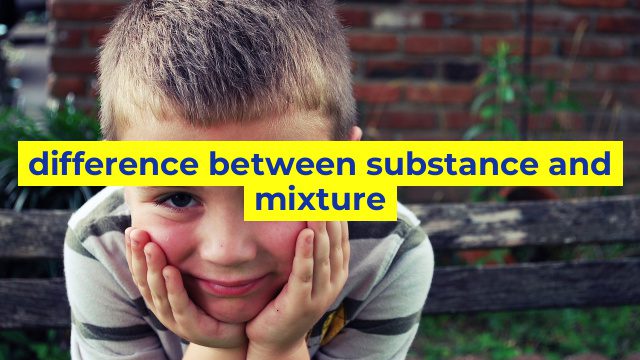The Difference Between Substance and Mixture
When it comes to chemistry, there are two broad categories of matter: substances and mixtures. A substance is a pure form of matter that has a constant composition and distinct chemical and physical properties. A mixture, on the other hand, is a combination of two or more substances that are not chemically combined and can be separated through physical means.
Characteristics of Substances
Substances can be either elements or compounds. An element is a substance that cannot be broken down into simpler substances through chemical means, while a compound is a substance that is made up of two or more elements that are chemically bonded together. Examples of substances include oxygen, gold, water, and sodium chloride.
Substances have specific physical and chemical properties that are unique to them. For example, water always has a boiling point of 100°C and a freezing point of 0°C, regardless of whether it is pure or contaminated. Chemical reactions involving substances always result in the creation of new substances with different properties.
Characteristics of Mixtures
Mixtures, on the other hand, are made up of two or more substances that are physically combined. Unlike substances, mixtures do not have a constant composition or set of properties. The properties of a mixture can vary depending on the amounts and types of substances that are present.
Mixtures can be either homogeneous or heterogeneous. A homogeneous mixture is one in which the composition is uniform throughout, while a heterogeneous mixture has non-uniform composition. Examples of mixtures include saltwater, air, and soil.
Physical methods can be used to separate mixtures into their component parts. For example, salt can be separated from saltwater through evaporation, while a magnet can be used to separate iron from a mixture of iron and sulfur.
Summary
The key difference between substances and mixtures is that substances are pure forms of matter with constant properties, while mixtures are combinations of substances that can vary in their composition and properties. Substances always have distinct chemical and physical properties that are unique to them, whereas mixtures can be separated into their component parts through physical means. Whether it is a substance or a mixture, understanding the properties and characteristics of matter is crucial in scientific investigations and technological advancements.
Table difference between substance and mixture
| Substance | Mixture | |
|---|---|---|
| Definition | A pure form of matter that has definite chemical and physical properties | Composed of two or more substances that are physically combined |
| Composition | Contains only one type of particle or molecule | Contains more than one type of particle or molecule |
| Properties | Has a fixed melting and boiling point, and a specific density | Physical and chemical properties depend on the composition and ratio of the substances in the mixture |
| Separation | Cannot be separated into simpler substances by physical means | Can be separated into its components by physical means such as filtration, distillation, or chromatography |
| Examples | Water, gold, oxygen | Air, saltwater, trail mix |
